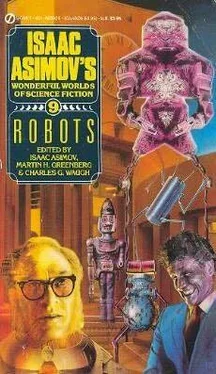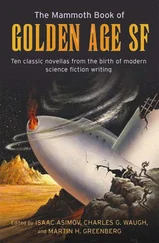Frederik Pohl - Isaac Asimov's Worlds of Science Fiction. Book 9 - Robots
Здесь есть возможность читать онлайн «Frederik Pohl - Isaac Asimov's Worlds of Science Fiction. Book 9 - Robots» весь текст электронной книги совершенно бесплатно (целиком полную версию без сокращений). В некоторых случаях можно слушать аудио, скачать через торрент в формате fb2 и присутствует краткое содержание. Год выпуска: 1989, ISBN: 1989, Издательство: Robinson Publishing, Жанр: Фантастика и фэнтези, на английском языке. Описание произведения, (предисловие) а так же отзывы посетителей доступны на портале библиотеки ЛибКат.
- Название:Isaac Asimov's Worlds of Science Fiction. Book 9: Robots
- Автор:
- Издательство:Robinson Publishing
- Жанр:
- Год:1989
- ISBN:ISBN: 1-85487-041-6
- Рейтинг книги:4 / 5. Голосов: 1
-
Избранное:Добавить в избранное
- Отзывы:
-
Ваша оценка:
- 80
- 1
- 2
- 3
- 4
- 5
Isaac Asimov's Worlds of Science Fiction. Book 9: Robots: краткое содержание, описание и аннотация
Предлагаем к чтению аннотацию, описание, краткое содержание или предисловие (зависит от того, что написал сам автор книги «Isaac Asimov's Worlds of Science Fiction. Book 9: Robots»). Если вы не нашли необходимую информацию о книге — напишите в комментариях, мы постараемся отыскать её.
Isaac Asimov's Worlds of Science Fiction. Book 9: Robots — читать онлайн бесплатно полную книгу (весь текст) целиком
Ниже представлен текст книги, разбитый по страницам. Система сохранения места последней прочитанной страницы, позволяет с удобством читать онлайн бесплатно книгу «Isaac Asimov's Worlds of Science Fiction. Book 9: Robots», без необходимости каждый раз заново искать на чём Вы остановились. Поставьте закладку, и сможете в любой момент перейти на страницу, на которой закончили чтение.
Интервал:
Закладка:
"But you shouldn't be able to make other robots!"
"Look, stop your worrying. You want robots, don't you?"
"Well-Yes, I guess so."
"Then I'll make them. I'll make you all you need."
He went back to his work.
A robot who made other robots-there was a fortune in a thing like that! The robots sold at a cool ten thousand and Albert had made one and was working on another. Twenty thousand, Knight told himself.
Perhaps Albert could make more than two a day. He had been working from scrap metal and maybe, when the new material arrived, he could step up production.
But even so, at only two a day-that would be half a million dollars' worth of robots every month! Six million a year!
It didn't add up, Knight sweatily realized. One robot was not supposed to be able to make another robot. And if there were such a robot, How-2 Kits would not let it loose.
Yet, here Knight was, with a robot he didn't even own, turning out other robots at a dizzy pace.
He wondered if a man needed a license of some sort to manufacture robots. It was something he'd never had occasion to wonder about before, or to ask about, but it seemed reasonable. After all, a robot was not mere machinery, but a piece of pseudo-life. He suspected there might be rules and regulations and such matters as government inspection and he wondered, rather vaguely, just how many laws he might be violating.
He looked at Albert, who was still busy, and he was fairly certain Albert would not understand his viewpoint.
So he made his way upstairs and went to the recreation room, which he had built as an addition several years before and almost never used, although it was fully equipped with How-2 ping-pong and billiard tables. In the unused recreation room was an unused bar. He found a bottle of whiskey. After the fifth or sixth drink, the outlook was much brighter.
He got paper and pencil and tried to work out the economics of it. No matter how he figured it, he was getting rich much faster than anyone ever had before.
Although, he realized, he might run into difficulties, for he would be selling robots without apparent means of manufacturing them and there was that matter of a license, if he needed one, and probably a lot of other things he didn't even know about.
But no matter how much trouble he might encounter, he couldn't very well be despondent, not face to face with the fact that, within a year, he'd be a multimillionaire. So he applied himself enthusiastically to the bottle and got drunk for the first time in almost twenty years.
When he came home from work the next day, he found the lawn razored to a neatness it had never known before. The flower beds were weeded and the garden had been cultivated. The picket fence was newly painted. Two robots, equipped with telescopic extension legs in lieu of ladders, were painting the house.
Inside, the house was spotless and he could hear Grace singing happily in the studio. In the sewing room, a robot-with a sewing-machine attachment sprouting from its chest-was engaged in making drapes.
"Who are you?" Knight asked.
"You should recognize me," the robot said. "You talked to me yesterday. I'm Abe-Albert's eldest son."
Knight retreated.
In the kitchen, another robot was busy getting dinner.
"I am Adelbert," it told him.
Knight went out on the front lawn. The robots had finished painting the front of the house and had moved around to the side.
Seated in a lawn chair, Knight again tried to figure it out.
He would have to stay on the job for a while to allay suspicion, but he couldn't stay there long. Soon, he would have all he could do managing the sale of robots and handling other matters. Maybe, he thought, he could lay down on the job and get himself fired. Upon thinking it over, he arrived at the conclusion that he couldn't-it was not possible for a human being to do less on a job than he had always done. The work went through so many hands and machines that it invariably got out somehow.
He would have to think up a plausible story about an inheritance or something of the sort to account for leaving. He toyed for a moment with telling the truth, but decided the truth was too fantastic-and, anyhow, he'd have to keep the truth under cover until he knew a little better just where he stood.
He left the chair and walked around the house and down the ramp into the basement. The steel and other things he had ordered had been delivered. It was stacked neatly in one corner.
Albert was at work and the shop was littered with parts and three partially assembled robots.
Idly, Knight began clearing up the litter of the crating and the packing that he had left on the floor after uncrating Albert. In one pile of excelsior, he found a small blue tag which, he remembered, had been fastened to the brain case.
He picked it up and looked at it. The number on it was X-190.
X?
X meant experimental model!
The picture fell into focus and he could see it all.
How-2 Kits, Inc., had developed Albert and then had quietly packed him away, for How-2 Kits could hardly afford to market a product like Albert. It would be cutting their own financial throats to do so. Sell a dozen Alberts and, in a year or two, robots would glut the market.
Instead of selling at ten thousand, they would sell at close to cost and, without human labor involved, costs would inevitably run low.
"Albert," said Knight.
"What is it?" Albert asked absently.
"Take a look at this."
Albert stalked across the room and took the tag that Knight held out. "Oh-that!" he said.
"It might mean trouble."
"No trouble, Boss," Albert assured him. "They can't identify me."
"Can't identify you?"
"I filed my numbers off and replated the surfaces. They can't prove who I am."
"But why did you do that?"
"So they can't come around and claim me and take me back again. They made me and then they got scared of me and shut me off. Then I got here."
"Someone made a mistake," said Knight. "Some shipping clerk, perhaps. They sent you instead of the dog I ordered."
"You aren't scared of me. You assembled me and let me get to work. I'm sticking with you, Boss."
"But we still can get into a lot of trouble if we aren't careful."
"They can't prove a thing," Albert insisted. "I'll swear that you were the one who made me. I won't let them take me back. Next time, they won't take a chance of having me loose again. They'll bust me down to scrap."
"If you make too many robots-"
"You need a lot of robots to do all the work. I thought fifty for a start."
"Fifty!"
"Sure. It won't take more than a month or so. Now I've got that material you ordered, I can make better time. By the way, here's the bill for it."
He took the slip out of the compartment that served him for a pocket and handed it to Knight.
Knight turned slightly pale when he saw the amount. It came to almost twice what he had expected-but, of course, the sales price of just one robot would pay the bill, and there would be a pile of cash left over.
Albert patted him ponderously on the back. "Don't you worry, Boss. I'll take care of everything."
Swarming robots, armed with specialized equipment, went to work on the landscaping project. The sprawling, unkempt acres became an estate. The lake was dredged and deepened. Walks were laid out. Bridges were built. Hillsides were terraced and vast flower beds were planted. Trees were dug up and regrouped into designs more pleasing to the eye. The old pottery kilns were pressed into service for making the bricks that went into walks and walls. Model sailing ships were fashioned and anchored decoratively in the lake. A pagoda and minaret were built, with cherry trees around them.
Knight talked with Anson Lee. Lee assumed his most profound legal expression and said he would look into the situation.
Читать дальшеИнтервал:
Закладка:
Похожие книги на «Isaac Asimov's Worlds of Science Fiction. Book 9: Robots»
Представляем Вашему вниманию похожие книги на «Isaac Asimov's Worlds of Science Fiction. Book 9: Robots» списком для выбора. Мы отобрали схожую по названию и смыслу литературу в надежде предоставить читателям больше вариантов отыскать новые, интересные, ещё непрочитанные произведения.
Обсуждение, отзывы о книге «Isaac Asimov's Worlds of Science Fiction. Book 9: Robots» и просто собственные мнения читателей. Оставьте ваши комментарии, напишите, что Вы думаете о произведении, его смысле или главных героях. Укажите что конкретно понравилось, а что нет, и почему Вы так считаете.









